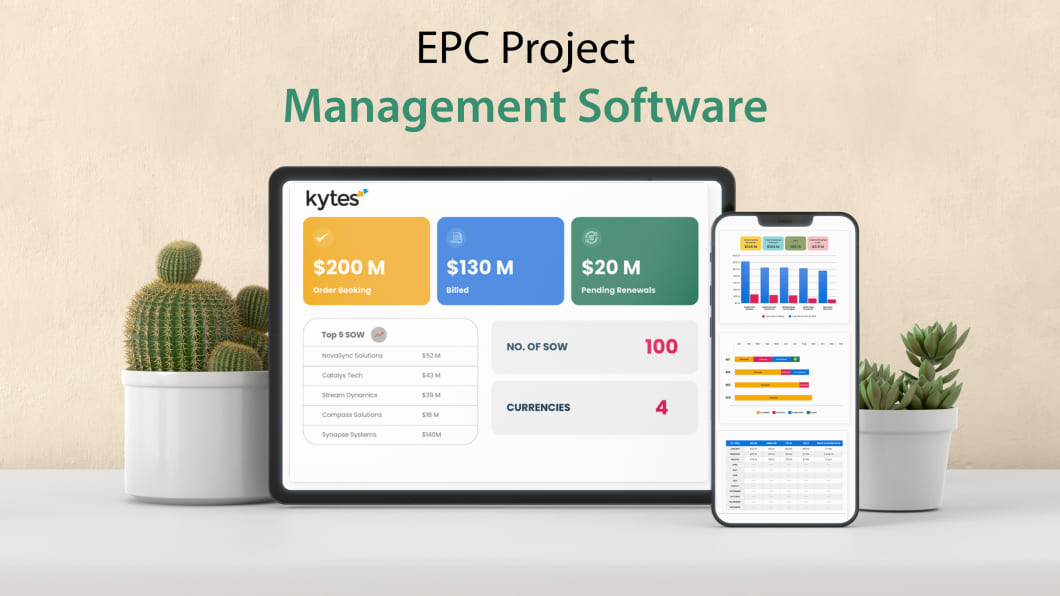Often time even the best-laid plans can suddenly go awry due to the numerous stages, cross-functional teams, and short timelines. Now combine geographically scattered teams, changing client demands, and changing regulations, and you have a high-stakes situation where accuracy and coordination are crucial.
All of this chaos is familiar to anyone who has ever tried to manage an EPC (Engineering, Procurement, and Construction) project using spreadsheets, email threads, and patchy updates. Designs are changed midstream, procurement delays throw timelines out of whack, and field crews struggle with patchy connectivity. By the time you get a status update, the reality on the ground has already shifted.
That’s why EPC project management software isn’t “nice to have”–it’s mission-critical. It adds order to the chaos, bridges your teams, and keeps all stages of the project moving forward with direction. So, what exactly should you expect from the right software—and how do you pick one that will work for EPC?
What Makes EPC Projects So Complex?
First, let’s understand the problem. EPC projects are inherently complicated with a vast network of internal and external stakeholders, multi-phase planning, and cross-functional collaboration among engineering, procurement, and construction teams.
These projects also must respond to shifting client requirements, strict compliance regulations, and geographically dispersed teams—working frequently in remote areas with limited on-site connectivity. Add more tight timelines and budget considerations to those, and it’s obvious that manual methods or standard project tools just won’t do the trick.
The Real Benefits of EPC Project Management Software
Here’s what a purpose-built EPC solution brings to the table:
1. End-to-End Project Visibility
Every aspect of the project is tracked in one location, from conception to commissioning. Real-time dashboards provide information about deadlines, deliverables, risks, financials, and resource usage, allowing for quicker and better decision-making.
2. Seamless Collaboration Across Functions
Engineering, procurement, and construction aren’t isolated silos. The software ensures alignment between teams, reduces communication delays, and ensures everyone works off the same data—regardless of location.
3. Accurate Forecasting and Budget Tracking
The margins are tight. With integrated cost controls and forecasting capabilities, EPC software enables you to spot financial deviations early, improve bid accuracy, and control budget slippage.
4. Mobility That Works in the Real World
Construction sites aren’t always tech friendly. Therefore, mobile access is essential. Field engineers and site managers can enter updates while on the go, synchronize when connected, and maintain alignment with headquarters with the correct EPC tool.
5. Better Risk and Compliance Management
With built-in checklists, documentation controls, and automated audit trails, EPC software makes it easier to stay compliant with safety standards, client requirements, and local regulations—without slowing you down.
Why Mobility is a Must (Not a Maybe)
Mobility in EPC isn’t just about accessing dashboards on your phone. It’s about empowering field teams with:
- On-the-go documentation: Upload photos, fill forms, or update site progress from mobile devices.
- Task tracking & checklists: Complete daily logs or HSE inspections in real-time.
- Seamless sync: Automatically update central systems when internet is available—no rework needed.
- Geo-tagging & timestamping: Improve transparency and validate site updates.
With geographically dispersed projects and dynamic field conditions, mobility transforms how quickly decisions are made—and how accurately progress is reported.
Key Features to Look for in an EPC Project Management Software
- Project Planning & Scheduling: Gantt charts, WBS management, milestone tracking
- Integrated Resource Management: Allocate the right people, track utilization, reduce idle time
- Procurement Tracking: Link procurement schedules to project milestones and site needs
- Document Control: Centralized repository with version control, approvals, and access logs
- Change Management: Monitor scope changes, cost impacts, and schedule deviations
- Mobile & Offline Access: Real-time access to tasks, forms, and reports—anytime, anywhere
- Dashboards & Analytics: Visual insights across financials, timelines, resources, and risks
The goal? One system that replaces a dozen spreadsheets and scattered tools.
The Cost of Not Investing
EPC projects don’t fail because of lack of effort—they fail because of lack of visibility, coordination, and control. Even the best strategies fail when teams are disjointed, data is out of date, and processes are manual.
Having the appropriate project management software is a strategic advantage rather than merely an operational improvement. From blueprint to handover, it enables your teams to work together more intelligently, act more quickly, and remain in sync.
That’s where Kytes comes in.
How Kytes Powers EPC Excellence
Kytes Agentic AI and Autonomous PSA + PPM is purpose-built for complex project environments like EPC. It offers end-to-end project lifecycle management, real-time collaboration tools, AI-assisted forecasting and scheduling, built-in mobility with offline mode, and seamless integration with ERP, HRMS, and financial systems. With Kytes, EPC teams don’t just manage projects—they master them. From proposal to handover, it empowers organizations to deliver with greater confidence, agility, and clarity. Book a demo and see how Kytes can help you deliver faster, smarter, and with complete confidence.

